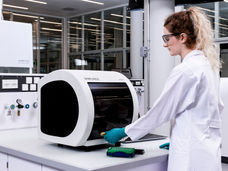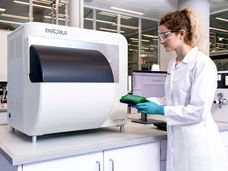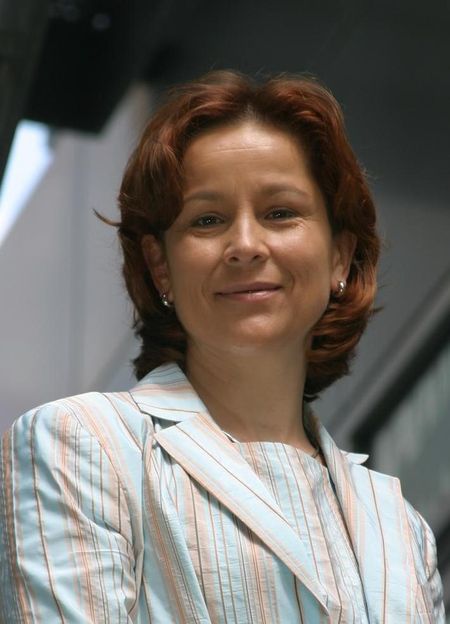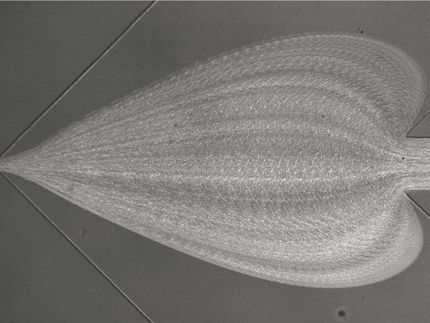A microfluidic biochip for blood cell counts at the point-of-care
Teams of researchers from the University of Illinois at Urbana-Champaign (UIUC) have demonstrated a biosensor capable of counting the blood cells electrically using only a drop of blood. The blood cell count is among the most ubiquitous diagnostic tests in primary health care. The gold standard routinely used in hospitals and testing laboratories is a hematology analyzer, which is large and expensive equipment, and requires trained technicians and physical sample transportation. It slows turn-around time, limits throughput in hospitals, and limits accessibility in resource-limited settings. Bashir and his team have developed a biosensor to count red blood cell, platelet, and white blood cell counts, and its 3-part differential at the point-of-care while using only 11 microL of blood.

(a) Schematic of the biosensor used for total leukocyte and its differential counts. The inset shows the micro-fabricated coplanar electrodes aligned with the cell counting aperture of cross-section 15 µm x 15 µm. (b) Representative voltage pulses generated as the individual cells pass over the electrodes. (c) The pulse amplitude histogram shows the distinct populations of lymphocytes and granulocytes + monocytes.
TECHNOLOGY
The microfluidic device can electrically count the different types of blood cells based on their size and membrane properties. To count leukocyte and its differentials, red blood cells are selectively lysed and the remaining white blood cells were individually counted. The specific cells like neutrophils were counted using multi-frequency analysis, which probe the membrane properties of the cells. However, for red blood cells and platelets, 1 microL of whole blood is diluted with PBS on-chip and the cells are counted electrically. The total time for measurement is under 20 minutes.
"Our biosensor exhibits the potential to improve patient care in a spectrum of settings. One of the compelling is in resource-limited settings where laboratory tests are often inaccessible due to cost, poor prevalence of laboratory facilities, and the difficulty of follow-up upon receiving results that take days to process," says Professor Rashid Bashir of the University of Illinois at Urbana-Champaign and Principal Investigator on the paper.
There exists a huge potential to translate our biosensor commercially for blood cell counts applications," says Umer Hassan, Ph.D., the lead author on this paper. "The translation of our technology will result in minimal to no experience requirement for device operation. Even, patients can perform the test at the comfort of their home and share the results with their primary care physicians via electronic means too." "The technology is scalable and in future, we plan to apply it to many other potential applications in the areas of animal diagnostics, blood transfusion analysis, ER/ICU applications and blood cell counting for chemotherapy management" says Professor Bashir. The clinical trials of the biosensor are done in collaboration with Carle Foundation Hospital, Urbana, IL.
The team from UIUC is working now to further develop a first portable prototype of the cell counter. "The cartridges will be disposable and the size of a credit card. The base unit or the reader will be portable and possibly hand-held. Our technology has the potential to reduce the cost of the test to less than $10 as compared to $100 or more currently charged," says Umer.
Original publication
Other news from the department science
These products might interest you

Octet R2 / Octet R4 / Octet R8 by Sartorius
Full power on 2, 4 or 8 channels: Label-free and GxP-compliant analysis of molecular interactions
Innovative label-free real-time protein quantification, binding kinetics and rapid screenings

Octet RH16 and RH96 by Sartorius
Efficient protein analysis for process optimisation and manufacturing control in high-throughput
Label-free protein quantification and characterization of protein-protein interactions

Octet SF3 by Sartorius
Surface Plasmon Resonance (SPR) using Single Dynamic Injections for Kinetics and Affinities
Curvature is Key - Adding a ‘Third Dimension’ to the Binding Curve

Get the life science industry in your inbox
By submitting this form you agree that LUMITOS AG will send you the newsletter(s) selected above by email. Your data will not be passed on to third parties. Your data will be stored and processed in accordance with our data protection regulations. LUMITOS may contact you by email for the purpose of advertising or market and opinion surveys. You can revoke your consent at any time without giving reasons to LUMITOS AG, Ernst-Augustin-Str. 2, 12489 Berlin, Germany or by e-mail at revoke@lumitos.com with effect for the future. In addition, each email contains a link to unsubscribe from the corresponding newsletter.
Most read news
More news from our other portals
Last viewed contents
Antagonism_(chemistry)
Genetic causes of canine mammary tumors
Forbion Closes Oversubscribed Fourth Life Sciences VC Fund at EUR 360 million - Investment focus is on new drugs and technologies



















































